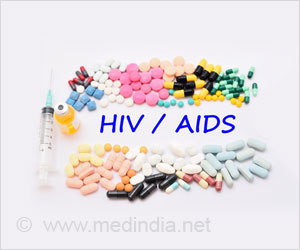HIV-positive widow Lilian Butau sits on a rickety stool on the veranda of her home in Harare's Mbare township, chewing on a small piece of calcium-rich rock, the only thing she has had to eat all day.
The worst affected by the political turmoil in Zimbabwe are the people who are HIV positive. HIV-positive widow Lilian Butau sits on a rickety stool on the veranda of her home in Harare's Mbare township, chewing on a small piece of calcium-rich rock, the only thing she has had to eat all day.
While many are going hungry in crisis-wracked Zimbabwe, Butau's case is more disturbing in that she is both struggling to get food and has also been unable to take life-prolonging antiretroviral drugs (ARVs) for the last four months.Butau -- who is blind, unemployed and has four children to look after -- is entitled to free ARVs under a government-sponsored scheme, but when she last went for new supplies, she was told the hospital had run out.
"I am taking this as a vitamin supplement. It's all I can afford," says Butau, showing an AFP reporter a piece of rock believed to be rich in calcium and widely licked by pregnant women in Zimbabwe.
The 45-year-old is just one of the many silent victims of Zimbabwe's political and economic turmoil which has devastated the health sector.
She had been a beneficiary of food aid from a Harare-based aid agency until last month when NGOs were ordered to suspend their operations after being accused by government of meddling in politics ahead of an election.
Although the government says it has since issued an exemption for those involved in HIV/AIDS and supplementary feeding schemes, the word does not seem to have filtered through to those on the ground.
Advertisement
Parirenyatwa admitted the directive had had an adverse impact, but said authorities were working to rectify it.
"I am hoping that the disruption was not long. We fear not only relapses, but also an emergence of resistance."
Despite the minister's comments, Fambai Ngirande, spokesman for the National Association of Non-governmental Organisations, says field workers still face obstacles.
"Some (NGOs) have tried going back to the field, but workers have not been free to move with truckloads of food and get stopped at roadblocks and asked for a clearance letter, which they would not possess," said Ngirande.
Douglas Muzanenhamo, who works with Butau as a counsellor for HIV sufferers, struggled to suppress his anger at the impact of the original order.
"They have killed people," said Muzanenhamo who was until recently coordinating a feeding scheme for orphans of AIDS victims.
"One of the children in my (feeding) programme died recently. It's heartbreaking."
Despite the economic turmoil which has enveloped Zimbabwe since the turn of the decade, the government's record on combating AIDS has won plaudits.
Officials representing Zimbabwe at the world AIDS conference in Mexico City will be able to point to an HIV prevalency rate which now stands at 15.6 percent of the adult population, having dropped from 31 percent in 2000.
Some 110,000 patients are recipients of free ARVs under a programme which began in 2004 and which ultimately aims to cater for 300,000.
"We want very well that those on ARVs should continue. We will not allow to stock in some areas and not in others," said Parirenyatwa.
Parirenyatwa also denied there were any ARVs supply problems.
"All of our people on ARVs are able to access them for the next three months".
Infected 23 years ago, Butau's greatest concern is that while she has lived this long with the virus, the stress of the past few months could accelerate her demise.
"I get so stressed the moment I start thinking about my status that I lose sleep," she said, her lips white from the stone she has been chewing.
"If we are going to die, it is going to be from hunger and stress."
Source-AFP
RAS/M















